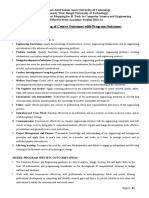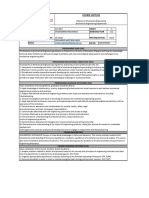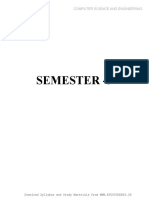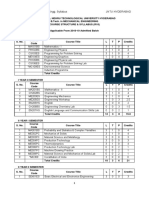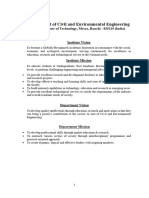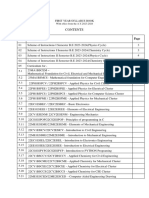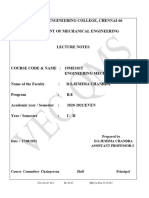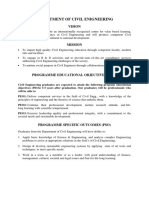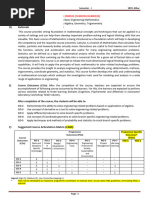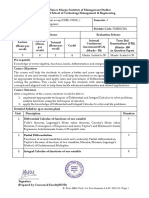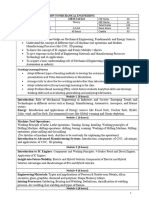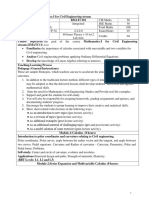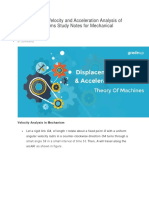CE 1011 - Course Profile
Uploaded by
masudmiazi169588Copyright:
Available Formats
CE 1011 - Course Profile
Uploaded by
masudmiazi169588Original Description:
Original Title
Copyright
Available Formats
Share this document
Did you find this document useful?
Is this content inappropriate?
Copyright:
Available Formats
CE 1011 - Course Profile
Uploaded by
masudmiazi169588Copyright:
Available Formats
Department of Civil Engineering
Dhaka University of Engineering & Technology, Gazipur
CE 1011
DEGREE PROGRAM: B.Sc. in Civil Engineering
COURSE CODE: CE 1011
COURSE TITLE: Analytic Mechanics
CREDIT: 3.0 (Theory) SEMESTER OFFERED: 1st year 2nd semester
Exam Hours: 3.00 CIE Marks: 30% SEE Marks: 70%
Course Outcomes (COs): On successful completion of this course, the student will be
able to-
CO1 Explain the basic terminologies and theories of analytic mechanics.
Calculate support reactions, member forces, and moments of rigid or moving
CO2
bodies using free body diagrams, centroids, and moment of inertia.
Utilize the basic concepts of mechanics to analyze and solve practical
CO3
engineering problems of statics and dynamics.
Mapping of Course Outcomes (COs) to Program Outcomes (POs)-
PO1 PO2 PO3 PO4 PO5 PO6 PO7 PO8 PO9 PO10 PO11 PO12
CO1
CO2
CO3
Alignment of Topics of the Course with Contact Hours
SN COURSE CONTENT Hrs
1 Coplanar and non-coplanar forces 3.0
2 Parallel and non-parallel forces 3.0
3 Analyses of two-dimensional frames and trusses 4.0
4 Maximum and minimum forces 2.0
5 Flexible chords 3.0
6 Friction 4.0
7 Centroids 3.0
8 Moment of inertia of areas 2.0
9 Moment of inertia of masses 2.0
10 Plane motion 3.0
11 Principles of work, power and energy 3.0
12 Impulse and momentum 3.0
13 Virtual work principle for rigid bodies 4.0
TEXTBOOK:
1. Analytic Mechanics, Faires & Chambars, 3rd Edition.
REFERENCE BOOKS: (List of reference books may vary depending upon the choice
of course teachers and time)
1. Engineering Mechanics Statics & Dynamics, R.C. Hibbler,15th Edition, 2015.
2. Vector Mechanics for Engineers (Statics & Dynamics), Beer & Johnson, 10th Edition.
3. Engineering Mechanics, Volume 1, Statics by Meriam, 5th Edition, 2002.
ASSESSMENT PATTERN:
CIE- Continuous Internal Evaluation
Bloom’s Category Class Tests: 20% In class Participation:
(60 Marks) (%) 10% (30 Marks) (%)
Remember 10 50
Understand 30 50
Apply 60 -
Analyze - -
Evaluate - -
SEE- Semester End Examination
Bloom’s Category Final Exam: 70%
(Marks 210) (%)
Remember 10
Explain 30
Apply 40
Analyze 20
Evaluate
Program Objectives (POs) of B. Sc. in Civil Engineering Program
Engineering knowledge: Apply the knowledge of mathematics, science,
PO1 engineering fundamentals and an engineering specialization to the solution
of complex engineering problems.
Problem analysis: Identify, analyze, formulate complex civil engineering
PO2 problems, and reach substantiated conclusions using first principles of
mathematics, the natural sciences and engineering sciences.
Design/development of solutions: Design solutions for complex civil
engineering problems and design system components or processes that meet
PO3
the specified needs with appropriate consideration for public health and
safety as well as cultural, societal and environmental concerns.
Investigation: Conduct investigations of real-life problems, considering
PO4 design of experiments, analysis and interpretation of data and synthesis of
information to provide valid conclusions.
Modern tool usage: Create, select and apply appropriate techniques,
PO5 resources and modern engineering and IT tools including prediction and
modeling to civil engineering activities with an understanding of limitations.
The engineer and society: Apply reasoning informed by contextual
knowledge to assess societal, health, safety, legal and cultural issues and the
PO6
consequent responsibilities relevant to professional civil engineering
practice.
Environment and sustainability: Understand the impact of professional
PO7 engineering solutions in societal and environmental contexts and
demonstrate the knowledge for sustainable development.
Ethics: Apply ethical principles and commit to professional ethics,
PO8
responsibilities, and the norms of the engineering practice.
Individual work and teamwork: Function effectively as an individual and
PO9 as a member or leader of diverse teams as well as in multidisciplinary
settings.
Communication: Communicate effectively about complex engineering
activities with the engineering community and with society at large. Be able
PO10
to comprehend and write effective reports, design documentation, make
effective presentations and give and receive clear instructions.
Project management and finance: Demonstrate knowledge and
understanding of the engineering and management principles and apply these
PO11
to one’s own work as a member or a leader of a team to manage projects in
multidisciplinary environments.
Life-long learning: Recognize the need for and have the preparation and
PO12 ability to engage in independent, life-long learning in the broadest context of
technological change.
You might also like
- University of Kerala: Syllabus FOR Semester Iii&IvNo ratings yetUniversity of Kerala: Syllabus FOR Semester Iii&Iv199 pages
- Engineering Physics 24PH110 - 24PH210 - First Year (1st and 2nd Sem) BENo ratings yetEngineering Physics 24PH110 - 24PH210 - First Year (1st and 2nd Sem) BE5 pages
- Code Semester/Year Pre-Requisite (S) Course Name Instructional Duration CreditNo ratings yetCode Semester/Year Pre-Requisite (S) Course Name Instructional Duration Credit2 pages
- Computer Science and Engineering - 2019 Scheme s3 Syllabus - Ktustudents - inNo ratings yetComputer Science and Engineering - 2019 Scheme s3 Syllabus - Ktustudents - in94 pages
- R18 B.Tech. Mechanical Engg. Syllabus Jntu HyderabadNo ratings yetR18 B.Tech. Mechanical Engg. Syllabus Jntu Hyderabad17 pages
- BSC Mechanical Engineering UET Taxila Course Outline50% (2)BSC Mechanical Engineering UET Taxila Course Outline72 pages
- Institute of Aeronautical Engineering: Course DescriptionNo ratings yetInstitute of Aeronautical Engineering: Course Description11 pages
- CSM - Course Structer & Syllabus - R20 (1st Year 1st Semester)No ratings yetCSM - Course Structer & Syllabus - R20 (1st Year 1st Semester)17 pages
- AR 20 - ME - I To IV SEM 11-12-2021 FINALNo ratings yetAR 20 - ME - I To IV SEM 11-12-2021 FINAL140 pages
- R22 B.tech. AI&ML I Year Syllabus-22-23No ratings yetR22 B.tech. AI&ML I Year Syllabus-22-2336 pages
- Prepared by Date: 27/08/2021 D.S.Jemima Chandra Assistant Professor-INo ratings yetPrepared by Date: 27/08/2021 D.S.Jemima Chandra Assistant Professor-I6 pages
- CIV - 2nd Year Syllabus 2017 18 Batch Admiited Students PDFNo ratings yetCIV - 2nd Year Syllabus 2017 18 Batch Admiited Students PDF44 pages
- VR17 - First Year Syllabus PO-CO Mapping Updated - EEENo ratings yetVR17 - First Year Syllabus PO-CO Mapping Updated - EEE37 pages
- R22 B.Tech AI DS IYear Syllabus Revised On 07 11 2022No ratings yetR22 B.Tech AI DS IYear Syllabus Revised On 07 11 202236 pages
- VR17 - First Year Syllabus PO-CO Mapping Updated - CSE PDFNo ratings yetVR17 - First Year Syllabus PO-CO Mapping Updated - CSE PDF37 pages
- B Tech First Year Syllabus Common For AllNo ratings yetB Tech First Year Syllabus Common For All47 pages
- JNTUA B.tech - CSE R23 I Year Course Structure and SyllabusNo ratings yetJNTUA B.tech - CSE R23 I Year Course Structure and Syllabus50 pages
- CSE UNITED CLUB With Navy Bule and NeonNo ratings yetCSE UNITED CLUB With Navy Bule and Neon36 pages
- R18 B.tech I Year Syllabus of EEE CSE IT UpdatedNo ratings yetR18 B.tech I Year Syllabus of EEE CSE IT Updated32 pages
- 5 B Tech CSE - R23 II Year Course Structure & SyllabiNo ratings yet5 B Tech CSE - R23 II Year Course Structure & Syllabi53 pages
- 4th Q. Physical Science - Aristotle and Galilean Motion100% (1)4th Q. Physical Science - Aristotle and Galilean Motion28 pages
- Advanced Electric Drives Prof. S. P. Das Department of Electrical Engineering Indian Institute of Technology, Kanpur Lecture - 38No ratings yetAdvanced Electric Drives Prof. S. P. Das Department of Electrical Engineering Indian Institute of Technology, Kanpur Lecture - 3817 pages
- Displacement, Velocity and Acceleration Analysis of Plane Mechanisms Study Notes For Mechanical EngineeringNo ratings yetDisplacement, Velocity and Acceleration Analysis of Plane Mechanisms Study Notes For Mechanical Engineering151 pages
- Dlp-Investigating Principles Governing MotionNo ratings yetDlp-Investigating Principles Governing Motion8 pages
- Mechanical Advantage For Inclined PlaneNo ratings yetMechanical Advantage For Inclined Plane25 pages
- Question Bank - Applied Physics - I 2021 RevisionNo ratings yetQuestion Bank - Applied Physics - I 2021 Revision13 pages
- Class IX-Mid Term QB - Physics (2023-24)No ratings yetClass IX-Mid Term QB - Physics (2023-24)2 pages
- The History and Philosophy of Astronomy Lecture 11: Galileo. Presentation100% (1)The History and Philosophy of Astronomy Lecture 11: Galileo. Presentation35 pages
- Class IX I.I.T.Foundation & Science Olympiad Curriculum & Chapter Notes PDFNo ratings yetClass IX I.I.T.Foundation & Science Olympiad Curriculum & Chapter Notes PDF69 pages
- Muscle Revolution_ Concepts and Recipes for Building Muscle -- Marco Toigo -- 1, 2024 -- Springer -- 9783662547649 -- 46319d28173264c6e63880f94f2e5bd2 -- Anna’s ArchiveNo ratings yetMuscle Revolution_ Concepts and Recipes for Building Muscle -- Marco Toigo -- 1, 2024 -- Springer -- 9783662547649 -- 46319d28173264c6e63880f94f2e5bd2 -- Anna’s Archive353 pages


